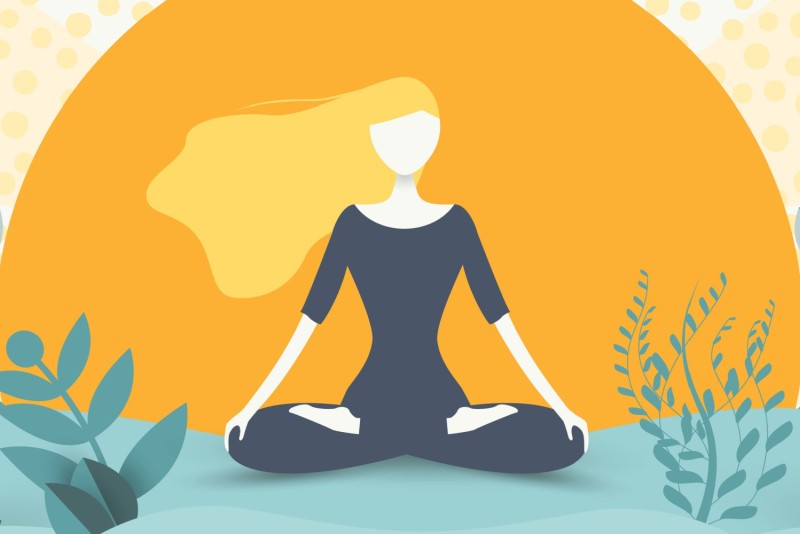Two Pro Tips For Effortless Meditation You’ll Actually Enjoy
Lots of effort is required in life in every area. We are always using our physical or mental energy to do something. We want to achieve something. To use our strength. We know that using our strength brings us joy and makes us stronger.
Meditation is different.
Try this as a practice: whenever you find yourself making an effort of any kind during meditation, take a breath and practice doing nothing.
This practice involves savoring, witnessing, allowing, melting, enjoying, and tolerating whatever pains you are feeling in your body or heart. Being willing to feel whatever you are feeling is not an effort.
This doing nothing, this being easy with yourself, is daring because it leads to restfulness, and when you are restful, whatever you’ve been forcing into the background is free to come into the foreground and ask for healing.
You don't "make" relaxation happen, you allow it when you are willing to feel whatever you are feeling. In a sense, being easy is a practice of courage because to have courage literally means to have heart, to be in the heart. When we enter the heart, we are willing to feel and heal whatever arises in us.
The issues, images, concerns, worries, fears, that arise in meditation are the very same ones that you face every night in your sleeping and dreaming time. The only difference is that in meditation you are conscious.
From Effort to Effortlessness
Whenever you notice yourself making an effort in meditation, remember the notion of effortlessness. This is a tiny shift in the quality of attention. It’s a noticing. There’s a subtle distinction.
The mind and body can be very busy releasing stress during meditation. You may witness the memory of work, the muscle memory of making an effort, and the muscle experience of tensing up. This is okay, this is healing. This is what it feels like when the body is retuning itself.
Notice These Two Kinds of Effort
The two kinds of effort to notice in meditation are technique and reviewing.
Technique: Are you making an effort to meditate and mistaking it for a meditation ‘technique’? Maybe you have resorted to an old habit of trying to block out thoughts, or trying to keep your mind fixed on the breath or a mantra.
Here are two interventions for when this happens:
- Take a breath. Allow an attitude of looseness, inattention, and relaxation of the rules. Get interested in your bodily sensations. Be curious. Is there a sensation somewhere in my body that is uncomfortable, something I am trying to block out?
- Release the rules. You might notice “I am not concentrating” and feel guilty about it. Remember that an aspect of meditation is unlearning habits of strain that do not work.
This shift in attention happens when you notice you are "working at meditation" in some way. Then, you remember this is not necessary and you simply allow yourself to experience whatever you are experiencing, even if it goes against some rule.
Reviewing: You may experience another kind of effort in the review, or replay, phases of meditation. Perhaps you were experiencing a few moments of relaxation and then you found yourself replaying an event from earlier in the day. Here you are remembering effort. You are replaying some activity of will, or labor, or trouble.
This is when it’s helpful to remember that replaying, or reviewing, is part of the flow of meditation. It’s part of how the body incorporates peacefulness into the rhythms of action. With each replay of some action scene, your body is practicing being more at ease, practicing releasing tension.
In both cases, you may feel you are "breaking a rule" by being relaxed and having an attitude of inattention. This is one area where it is truly beneficial if a person can get skillful step-by-step guidance when beginning meditation so you can unlearn habits of strain and adopt an attitude of ease and relaxation right away.
Let Your Meditation Be Playful and Effortless
In general, as a sort of truism, everyone is way too serious about meditation. There is too much worry about doing it right, and this leads to incorrect effort. As the Yoga Sutras explain: the path is transiting from effort to effortless, and this can feel like a violation of the rules.
Our meditation time allows for deep playful immersion in the flow of life. Meditation is play time because nothing matters. You aren't being graded, there’s no external voice you need to appease. There are no rules to follow that are not those of your own integrity and true nature.
Life can be serious and hard work. Meditation is different — it is playful and effortless.
Note: This is a guest post by nondual meditation teacher and founder of Instinctive Meditation®, Lorin Roche, PhD.
If you’d like to learn more from Lorin and explore effortless meditation, join him alongside iRest Founder, Richard Miller for the 2-day workshop Freedom and Delicious Rest: Inner Freedom, Yoga Nidra, and Joyous Meditation in January 2023.







Join the conversation
We would love to hear what you have to say. Log in or Register to post comments.